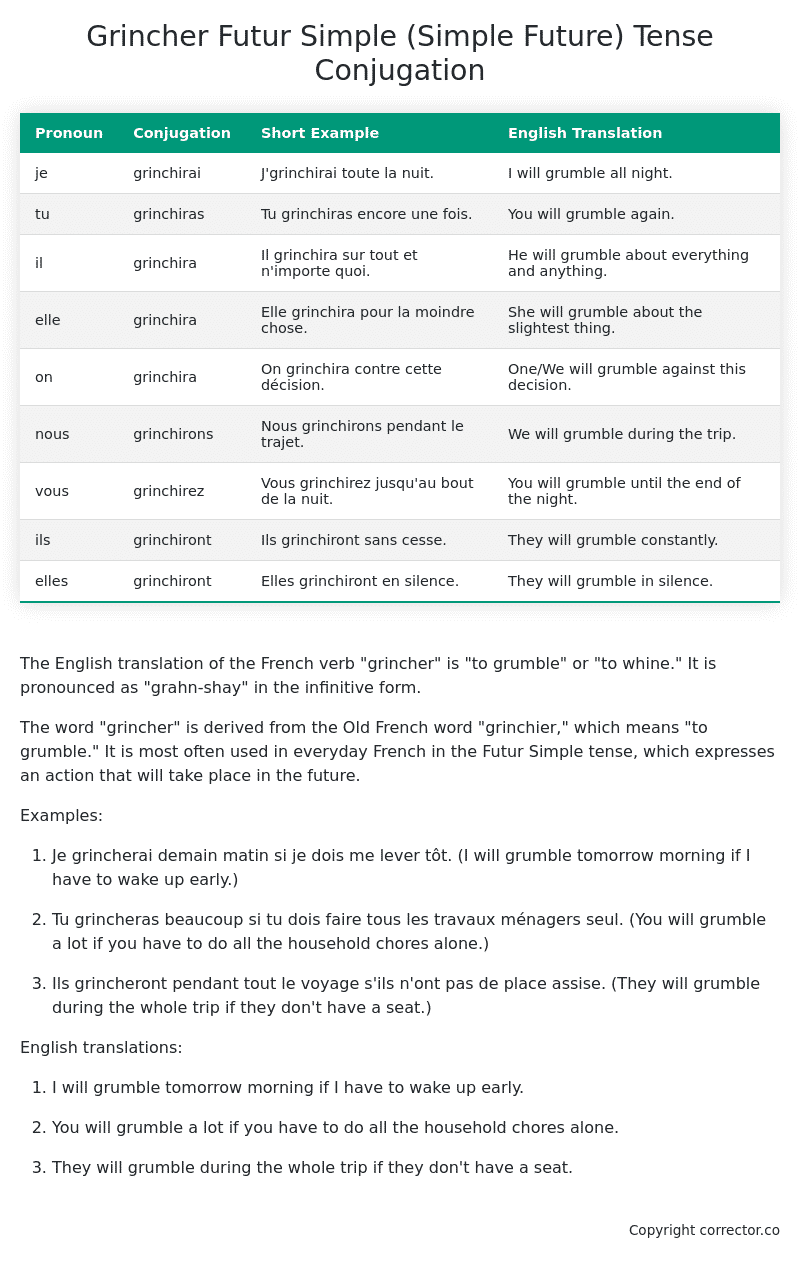Futur Simple (Simple Future) Tense Conjugation of the French Verb grincher
Introduction to the verb grincher
The English translation of the French verb “grincher” is “to grumble” or “to whine.” It is pronounced as “grahn-shay” in the infinitive form.
The word “grincher” is derived from the Old French word “grinchier,” which means “to grumble.” It is most often used in everyday French in the Futur Simple tense, which expresses an action that will take place in the future.
Examples:
-
Je grincherai demain matin si je dois me lever tôt. (I will grumble tomorrow morning if I have to wake up early.)
-
Tu grincheras beaucoup si tu dois faire tous les travaux ménagers seul. (You will grumble a lot if you have to do all the household chores alone.)
-
Ils grincheront pendant tout le voyage s’ils n’ont pas de place assise. (They will grumble during the whole trip if they don’t have a seat.)
English translations:
-
I will grumble tomorrow morning if I have to wake up early.
-
You will grumble a lot if you have to do all the household chores alone.
-
They will grumble during the whole trip if they don’t have a seat.
Table of the Futur Simple (Simple Future) Tense Conjugation of grincher
| Pronoun | Conjugation | Short Example | English Translation |
|---|---|---|---|
| je | grinchirai | J’grinchirai toute la nuit. | I will grumble all night. |
| tu | grinchiras | Tu grinchiras encore une fois. | You will grumble again. |
| il | grinchira | Il grinchira sur tout et n’importe quoi. | He will grumble about everything and anything. |
| elle | grinchira | Elle grinchira pour la moindre chose. | She will grumble about the slightest thing. |
| on | grinchira | On grinchira contre cette décision. | One/We will grumble against this decision. |
| nous | grinchirons | Nous grinchirons pendant le trajet. | We will grumble during the trip. |
| vous | grinchirez | Vous grinchirez jusqu’au bout de la nuit. | You will grumble until the end of the night. |
| ils | grinchiront | Ils grinchiront sans cesse. | They will grumble constantly. |
| elles | grinchiront | Elles grinchiront en silence. | They will grumble in silence. |
Other Conjugations for Grincher.
Le Present (Present Tense) Conjugation of the French Verb grincher
Imparfait (Imperfect) Tense Conjugation of the French Verb grincher
Passé Simple (Simple Past) Tense Conjugation of the French Verb grincher
Passé Composé (Present Perfect) Tense Conjugation of the French Verb grincher
Futur Simple (Simple Future) Tense Conjugation of the French Verb grincher (this article)
Futur Proche (Near Future) Tense Conjugation of the French Verb grincher
Plus-que-parfait (Pluperfect) Tense Conjugation of the French Verb grincher
Passé Antérieur (Past Anterior) Tense Conjugation of the French Verb grincher
Futur Antérieur (Future Anterior) Tense Conjugation of the French Verb grincher
Subjonctif Présent (Subjunctive Present) Tense Conjugation of the French Verb grincher
Subjonctif Passé (Subjunctive Past) Tense Conjugation of the French Verb grincher
Subjonctif Imparfait (Subjunctive Imperfect) Tense Conjugation of the French Verb grincher
Subjonctif Plus-que-parfait (Subjunctive Pluperfect) Tense Conjugation of the French Verb grincher
Conditionnel Présent (Conditional Present) Tense Conjugation of the French Verb grincher
Conditionnel Passé (Conditional Past) Tense Conjugation of the French Verb grincher
L’impératif Présent (Imperative Present) Tense Conjugation of the French Verb grincher
L’infinitif Présent (Infinitive Present) Tense Conjugation of the French Verb grincher
Struggling with French verbs or the language in general? Why not use our free French Grammar Checker – no registration required!
Get a FREE Download Study Sheet of this Conjugation 🔥
Simply right click the image below, click “save image” and get your free reference for the grincher Futur Simple tense conjugation!

Grincher – About the French Futur Simple (Simple Future) Tense
Formation of Futur Simple
For regular -er verbs (e.g., parler – to speak)
For regular -ir verbs (e.g., finir – to finish)
For regular -re verbs (e.g., vendre – to sell)
Common Everyday Usage Patterns
Conditional Statements
Interactions with Other Tenses
Futur Antérieur
Conditional
Present
Summary
I hope you enjoyed this article on the verb grincher. Still in a learning mood? Check out another TOTALLY random French verb conjugation!


